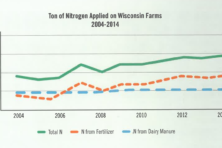Groundwater Work Group Completing Public Meetings
- Share
- Tweet
- Pin
- Share
A work group comprised of Kewaunee County farmers, concerned citizens, environmental organizations, agriculture specialists, and federal, state and local government officials are moving ahead on developing recommendations to address the area’s groundwater quality problem.
The Groundwater Collaboration Work Groups were formed in 2015 in response to concerns raised over groundwater quality issues in Kewaunee County from pollutants associated with agriculture. The DNR convened these work groups, in part, in response to environmental organizations’ petition to the EPA requesting emergency action to address the groundwater quality crisis in Kewaunee County. In Kewaunee County, recent testing conducted by DNR-funded researchers indicates a significant number of private wells sampled exceeded current federal standards for nitrates, coliform bacteria or E. coli.
Work Group member and Lincoln Township resident Jodi Parins commented, “The groups are developing potential solutions to improve groundwater quality. While we hope everyone will adopt the recommendations as soon as possible, it will be up to the various stakeholders as to how, or if, they are implemented.”
In addition to regulatory changes and other practical measures, the groups have identified a number of legislative changes that would have a positive impact.
“Representative Joel Kitchens has already used a part of one of the recommendations and introduced changes to the well compensation program. That’s the initiative we need to see,” Parins said.
Four issue-specific subgroups were formed to propose recommendations:
- Short-Term Solutions Work Group: This group reviewed and defined possible solutions for individuals in Kewaunee County and beyond who have wells that are contaminated by bacteria and/or nitrates. The recommendations address options for residents whose private wells become contaminated to quickly and efficiently attain a safe drinking water source and to potentially identify the source of the contamination.
- Sensitive Areas/Best Management Practices Work Group: This group’s goal is to define sensitive areas that are high risk for groundwater pollution and to recommend agricultural management practices that, if implemented, should help reduce or eliminate groundwater pollution and associated public health risk within these sensitive areas.
- Compliance Work Group: This group has reviewed and evaluated the county’s and state’s current compliance structure regarding regulated activities that affect groundwater in Kewaunee County, including manure application by animal feeding operations, well installation/compliance, and septic system compliance. The recommendations made addressed gaps in the current structure and, if implemented, should improve water quality.
- Communications Work Group: This group is reviewing recommendations from the other three work groups, compiling a final report, and discussing how best to communicate this information to stakeholders and the public.
- A fifth group, aptly named Alternative Technologies, has yet to start its work. The goal of this group will be to look into different farming methods and manure treatment technologies that would protect the county’s aquifer. This group will discuss new and established farming techniques.
The Short-term Solutions and Compliance Work Groups have completed their meetings and have prioritized their recommendations. The Sensitive Areas and Communications Work Groups are still meeting. All meetings are open to the public.
“The Sensitive Areas group is moving a little slower because it is extremely important,” said Davina Bonness, director of Kewaunee County’s Land and Water Conservation Dept. “The report from that group will be recommendations for voluntary acceptance by the farmers and livestock facility operators. My hope is that everyone adopts some or all the recommendations so that together we can achieve improved water quality.”
In order for these recommendations to be enforceable by law, the DNR or other regulatory entities, such as the county, would need to adopt these as regulations or ordinances.
Reports and other documents produced to date in each of the Work Groups are available online on Midwest Environmental Advocates website (midwestadvocates.org) and Kewaunee County’s website (kewauneeco.org). The Work Groups’ meeting schedules, agenda and other documents are available on the DNR’s website. Visit the DNR’s website for general information by searching keyword “groundwater.”
The Work Groups will release the final report, complete with meeting minutes and references, this spring. In the interim, the individual Work Group reports are being shared as they are finalized with the specific entities responsible for adopting and implementing the recommendations.

